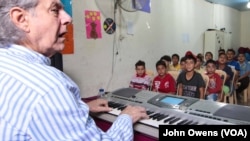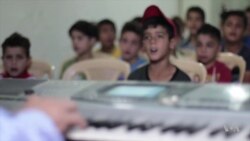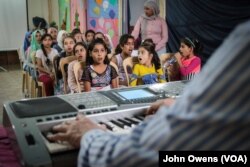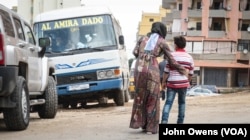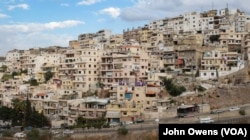The maestro emits a squawking sound in mock imitation of his young choir and the concentrated faces peering back at him break into smiles and giggles.
“No, no — like this!” exclaims maestro Salim Sahab, repeating the notes somewhat more melodiously as he repeats the same tune for what seems like the hundredth time.
It’s an uphill battle, but for this collection of Lebanese, Syrian and Palestinian youngsters gathered in Lebanon’s second city of Tripoli, it is also, finally, a chance to dream.
WATCH: In Lebanon, Maestro Helps Voices of Refugee Children Rise Above Poverty, Divisions
The chance to dream
In the coming months, about 300 children from deprived backgrounds across the country will find respite from their daily struggles as they learn to sing from a true expert. Renowned composer and conductor Sahab is putting his talents to use in creating the choir ahead of a major performance, complete with orchestra and big audience, in around half a year’s time.
Working in collaboration with the International Labor Organization and local NGO Beyond Association, Sahab held auditions across Lebanon, during which around 2,000 children, most of whom work, put their vocal chords to the test. He confessed that he found it difficult to whittle the numbers so he could create a manageable choir. However, ultimately, he emphasized, it was not about how well they learned to sing.
“I don’t want to make them musicians, I want to use music to reach something else,” said the Lebanon-born Sahab, who has created a children’s choir in Egypt that has since performed in front of international leaders.
“I was determined to [teach them] how to dream about the future,” he said.
Hope for the future
Among those now dreaming is 14-year-old Syrian refugee Raed Abdo. A fan of famed Arabic singers like Fairuz and Umm Kulthum, he made it through the auditions and is among the children attending the session in Tripoli.
It is one of five such groups across the country taking regular lessons from Sahab before a rehearsal brings them all together in December ahead of a big public performance next year.
“I was afraid the maestro would not accept me, and I was so happy when he said he liked my voice,” Raed said. “Singing gives me hope for the future. If I go and sing maybe I’ll become famous, like a famous singer, and people will listen to our songs and play them in the car.”
Working to live
Raed, who is from Homs, works 12-hour shifts as a carpenter to help his family pay rent for their small flat in Tripoli. He has a dream, however, that remains distant; attending school full time.
A long-existing problem with child labor in Lebanon was exacerbated by the Syrian conflict and the subsequent influx of Syrian refugees, like Abdo, into the country.
This summer the United Nations Children’s Fund (UNICEF) estimated that alongside Lebanese and Palestinians, 180,000 Syrian children were working in the country, whether it was selling flowers in the streets, helping in garages or digging potatoes in the fields of the Bekaa Valley.
According to Hayat Osseiran, an ILO child labor consultant, the choir offered not just a form of relief from the stress of such work but “a means of advocacy” through the public performances “that shows all these forgotten children need is a chance.”
United by singing
Meanwhile, under the tutelage of Sahab and with nothing but improving their voices to focus on, the national and sectarian differences that can play a divisive a role in the country become irrelevant.
Tensions over the Palestinian refugee population, and more recently that of Syrian refugees, bubble away within Lebanon. Recently, there have been ever-louder calls among some politicians to repatriate Syrians despite major concerns for their safety.
All that Jibril Latach knows, however, is that when it comes to the big performance, which is set to be held in an undisclosed location in around half a year’s time, he wants to be singing side by side with his friend Raed.
Jibril, 16 and Lebanese, is from a violence-scarred neighborhood in Tripoli, and he said he started working after his school shut down amid conflict a few years ago.
“When I went to work I was happy, in the beginning, because I was trying something new and felt like I was becoming an adult,” he said. “But then I got tired doing my job, and I regret leaving the school.”
Unlike his Syrian friend, it is hip-hop rather than the classic singers of yesteryear that appeals to Jibril. But having met Raed through the Beyond Association and its center, which is where the choir rehearses, he explains it is not just his vocal range that is growing.
“This experience has allowed me to meet people I’ve not met before,” he added.




